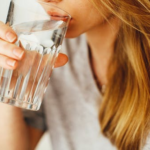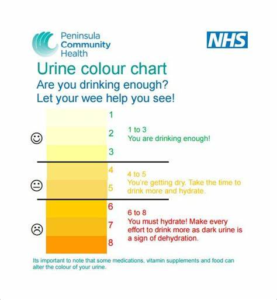Roughly, 60-65% of the human body is water, and 75-85% of the brain is made up of water, but do you drink enough to sustain the organs. Read below to find out exactly what drinking water can do for you, and what the science behind it is!
Water plays a significant role in the body; aids in digestion and absorption helps with energy production, lubricates joints, carries substances around the body, clears waste products and delivers oxygen, to name some.

We are constantly losing water throughout the day through urine, sweat and in our breath; to ensure the body is fully hydrated, we should drink plenty of water. Even an inadequate drop (as little as 2% in body water) can have major effects on not only our health but also performance. Dehydration can result in the body preserving water in areas like the brain and nervous system, however, skin, hair, joints and digestive function have a drop in water. Symptoms of dehydration are headaches, short-term memory, muscle cramping, fatigue, dry skin, brittle hair, and constipation. Studies have found dehydrated participants struggled to do basic math problems, suggesting it alters focus. Illnesses such as fever, vomiting or diarrhoea, cause your body to lose additional fluids. In these cases, you should drink more fluids, bladder infections and urinary tract stones also require increased water intake.
Signs of dehydration are visible in your urine. A urine chart can help you assess your levels of hydration by checking your urine. Dark and strong-smelling urine is a clear sign that you need to drink more fluids, whereas light and odourless urine will indicate your drinking enough water to maintain hydration.

Good hydration can prevent you from getting urinary tract infections (UTIs), headaches, constipation, confusion, kidney stones, skin conditions like pressure ulcers (mostly seen in the elderly) and poor health.
There is a lack of scientific evidence that shows the ideal amount of water that should be consumed, despite the general government guidelines that suggest 8-10 glasses of water a day. Many factors including age, temperature, medication, type of activity and its intensity and the water and nutritional content of the food you eat impact the amount of water you require.
To ensure you get the right amount of water, check out some tips below that will help:
- Keep a bottle of water on your desk at work, or fill a jug of water to drink during the day at home. Seeing it is a reminder and this way, you can monitor how much you have drunk as opposed to keeping a score of how many glasses you have had.
- Eat foods that have higher water content like cucumber, watermelon, lettuce, celery, grapes, oranges, tomatoes.
- If drinking water becomes boring, try some variety like spa water or herbal and fruit teas.
- Either add a squeeze of lemon or lime to your water or add a slice of fruits and herbs to water and leave in a jug or bottle overnight to allow the flavours to infuse into the water.
- Oranges, lemon slices, strawberry and basil, and mint and cucumber make great, refreshing drinks.
- If cold drinks are not your thing, then add apple slices and a cinnamon stick in hot water, or even ginger and lemon!
If this resonates with you then…
This article was written by our team of specialist therapists at Perfect Balance Clinic. If you would like more specific advice about how our team can help you with this condition or symptoms you may be having, please complete the contact form below and one of the team will get back to you shortly.






